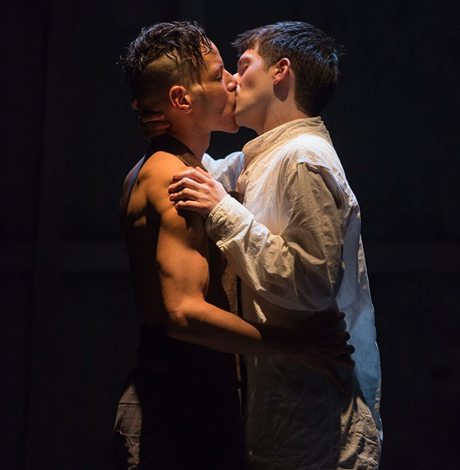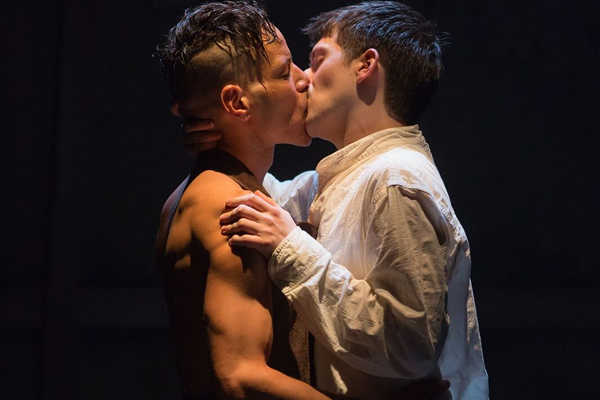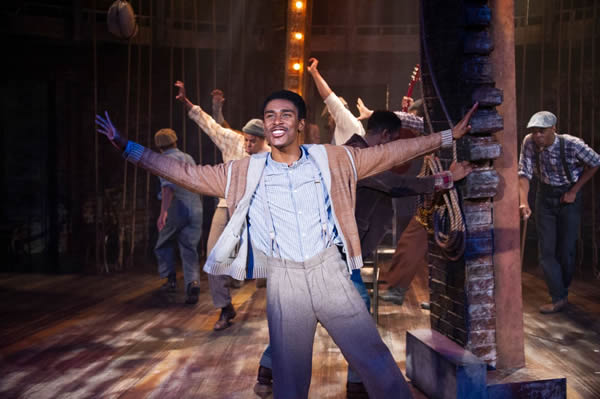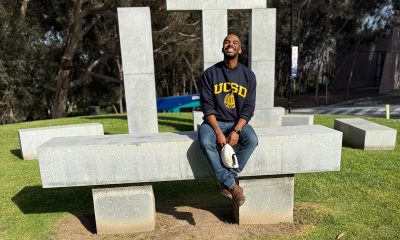Theater
Woolly’s ‘Fire’ reframes famed painter
Signature’s ‘Scottsboro Boys’ revisits grim racial tragedy


Jon Hudson Odom (left) and James Crichton in ‘Botticelli in the Fire.’ (Photo by Scott Suchman)
‘Botticelli in the Fire’
Through June 24
Woolly Mammoth Theatre Company
641 D Street, NW$20-69
202-393-3939

Lamont Walker II and the cast of ‘The Scottsboro Boys.’ (Photo by C. Stanley Photography; courtesy Signature)
‘The Scottsboro Boys’
Through July 1
4200 Campbell Avenue, Arlington
$40-110
703-820-977
Sometimes illuminations, or at least entertainment, come looking backward through a gay lens.
Woolly Mammoth Theatre Company is offering the American premiere of out playwright Jordan Tannahill’s “Botticelli in the Fire,” a boldly modern and sexy reimagining of historical gay characters in Renaissance Florence.
It opens with Sandro Botticelli (out actor Jon Hudson Odom) staggering boozily through the audience to the stage. The great Renaissance painter is ready to dish, and girl, as Tannahill would have him say, does he have a story to tell. Looking back from the beyond, Botticelli remembers halcyon days as hot art star and darling of the Medici, the de facto rulers of glorious Renaissance Florence. But that was before Botticelli’s 1497 downfall. And, as he reminds us, everybody loves to hear about a downfall.
An enthusiastic voluptuary since birth as his plainspoken mother, Madre Maria (Dawn Ursula), explains, Botticelli believes in excess, pleasure and beauty; and while mostly interested in men, he’s willing to sleep with women too. Currently, he’s having an affair with the sexually free and beautiful Clarice Orsini (Alyssa Wilmoth Keegan), and because she’s sitting for Botticelli’s masterpiece “The Birth of Venus,” their assignations are frequent. At the same time, Botticelli is falling in love with his artistically precocious, fresh-from-the-farm assistant, Leonardo Da Vinci (James Crichton). And yet he still makes time to party hard with his outrageous gay bestie Poggio du Chullu (Earl T. Kim).
But there’s trouble in the city state. Botticelli’s patron and Clarice’s husband, the ruthless Lorenzo de’ Medici (Cody Nickell) is on to their affair. And outside the cossetted confines of Botticelli’s studio and the palace, the plague has resurfaced and the populace is panicked. Citizens are aligning with conservative friar Girolamo Savonarola (Craig Wallace) and they’re burning gay artists in the town square.
Director Marti Lyons has staged a series of beautiful tableau-like scenes, some of which could stand alone. Instances include a captive Leonardo calling to God from the bottom of a medieval septic tank: “If I am a Sodomite what are you?” And later, Botticelli lies across his plainspoken mother’s lap (à la Michelangelo’s Pietà) as she sponge-bathes him. Madre Maria advises her son to choose what he loves most, advice that ultimately leads him to burn his own paintings in a dramatic burning of art, books and finery.
It’s not a perfect piece, however. The script is uneven — campy repartee between gay characters gets tired and the actors have to work hard to land some stale jokes. Luckily, the strong cast keeps things afloat.
In the queering (or reexamining history from a queer lens) of the past, Tannahill takes liberties in creating a compelling gay love story rife with anachronisms — timely and amusing — in dialogue and sublime design. We’re reminded how the rights of artists and LGBT people are, again and again, called into question.
Across the Potomac in Arlington, Signature Theatre presents John Kander and Fred Ebb’s “The Scottsboro Boys,” a musical drawn from a grim episode in American history. Like Kander & Ebb’s musicals “Cabaret” and “Chicago,” this their final collaboration also takes on social issues with great theatricality. Here, a hideous true tale of Jim Crow injustice unfolds framed as a minstrel show.
Performed beneath a decaying proscenium arch, Signature’s production, staged by out director Joe Calarco with athletic choreography by Jared Grimes is smart and compelling theater. The Depression-era story is familiar. Nine down-and-out young African-American men and boys are riding the rails in search of work when they are falsely accused of rape by two young white women. Immediately jailed in Scottsboro, Ala.,, they are tried and condemned to death. Their fate becomes a cause with New York liberals, prompting famed Jewish defense attorney Samuel Leibowitz to take their case which leads to subsequent retrials and convictions.
Stacked with minstrel stock characters — the Interlocutor, or emcee (Christopher Bloch), who represents the voice of the Old South, and broad comics Mr. Bones (the excellent Stephen Scott Wormley) and Mr. Tambo (Chaz Alexander Coffin) — we’re offered a glimpse into American theater history. As communicated by Kander and Ebb, the experience isn’t always easy. It’s sometimes uncomfortable to reconcile cake-walking, tap dancing choreography and the score’s upbeat ragtime tunes with themes of racism, anti-Semitism, injustice and brutality.
The focus is pulled on the most defiant of the Scottsboro boys, Haywood Patterson (played gracefully by Lamont Walker II). Other cast standouts include Aramie Payton as 12-year-old Eugene, the youngest of the accused, and DeWitt Fleming, Jr., who plays one of the boys as well as star witness Ruby Bates.
Well into the second act, when the young convicts’ last glimmer of hope for vindication is sufficiently dashed, things become especially heartbreaking. And the show’s final number in which the actors playing the boys relay their character’s uniformly tragic ends proves even sadder.
Theater
José Zayas brings ‘The House of Bernarda Alba’ to GALA Hispanic Theatre
Gay Spanish playwright Federico García Lorca wrote masterpiece before 1936 execution

‘The House of Bernarda Alba’
Through March 1
GALA Hispanic Theatre
3333 14th St., N.W.
$27-$52
Galatheatre.org
In Federico García Lorca’s “The House of Bernarda Alba,” now at GALA Hispanic Theatre in Columbia Heights, an impossibly oppressive domestic situation serves, in short, as an allegory for the repressive, patriarchal, and fascist atmosphere of 1930s Spain
The gay playwright completed his final and arguably best work in 1936, just months before he was executed by a right-wing firing squad. “Bernarda Alba” is set in the same year, sometime during a hot summer in rural Andalusia, the heart of “España profunda” (the deep Spain), where traditions are deeply rooted and mores seldom challenged.
At Bernarda’s house, the atmosphere, already stifling, is about to get worse.
On the day of her second husband’s funeral, Bernarda Alba (superbly played by Luz Nicolás), a sixtyish woman accustomed to calling the shots, gathers her five unmarried daughters (ages ranging from 20 to 39) and matter-of-factly explain what’s to happen next.
She says, “Through the eight years of mourning not a breeze shall enter this house. Consider the doors and windows as sealed with bricks. That’s how it was in my father’s house and my grandfather’s. Meanwhile, you can embroider your trousseaux.”
It’s not an altogether sunny plan. While Angustias (María del Mar Rodríguez), Bernarda’s daughter from her first marriage and heiress to a fortune, is betrothed to a much younger catch, Pepe el Romano, who never appears on stage, the remaining four stand little chance of finding suitable matches. Not only are they dowry-less, but no men, eligible or otherwise, are admitted into their mother’s house.
Lorca is a literary hero known for his mastery of both lyrical poetry and visceral drama; still, “Bernarda Alba’s” plotline might suit a telenovela. Despotic mother heads a house of adult daughters. Said daughters are churning with passions and jealousies. When sneaky Martirio (Giselle Gonzáles) steals the photo of Angustias’s fiancé all heck kicks off. Lots of infighting and high drama ensue. There’s even a batty grandmother (Alicia Kaplan) in the wings for bleak comic relief.
At GALA, the modern classic is lovingly staged by José Zayas. The New York-based out director has assembled a committed cast and creative team who’ve manifested an extraordinarily timely 90-minute production performed in Spanish with English subtitles easily ready seen on multiple screens.
In Lorca’s stage directions, he describes the set as an inner room in Bernarda’s house; it’s bright white with thick walls. At GALA, scenic designer Grisele Gonzáles continues the one-color theme with bright red walls and floor and closed doors. There are no props.
In the airless room, women sit on straight back chairs sewing. They think of men, still. Two are fixated on their oldest siter’s hunky betrothed. Only Magdelena (Anna Malavé), the one sister who truly mourns their dead father, has given up on marriage entirely.
The severity of the place is alleviated by men’s distant voices, Koki Lortkipanidze’s original music, movement (stir crazy sisters scratching walls), and even a precisely executed beatdown choreographed by Lorraine Ressegger-Slone.
In a short yet telling scene, Bernarda’s youngest daughter Adela (María Coral) proves she will serve as the rebellion to Bernarda’s dictatorship. Reluctant to mourn, Adela admires her reflection. She has traded her black togs for a seafoam green party dress. It’s a dreamily lit moment (compliments of lighting designer Hailey Laroe.)
But there’s no mistaking who’s in charge. Dressed in unflattering widow weeds, her face locked in a disapproving sneer, Bernarda rules with an iron fist; and despite ramrod posture, she uses a cane (though mostly as a weapon during one of her frequent rages.)
Bernarda’s countenance softens only when sharing a bit of gossip with Poncia, her longtime servant convincingly played by Evelyn Rosario Vega.
Nicolás has appeared in “Bernarda Alba” before, first as daughter Martirio in Madrid, and recently as the mother in an English language production at Carnegie Melon University in Pittsburgh. And now in D.C. where her Bernarda is dictatorial, prone to violence, and scarily pro-patriarchy.
Words and phrases echo throughout Lorca’s play, all likely to signal a tightening oppression: “mourning,” “my house,” “honor,” and finally “silence.”
As a queer artist sympathetic to left wing causes, Lorca knew of what he wrote. He understood the provinces, the dangers of tyranny, and the dimming of democracy. Early in Spain’s Civil War, Lorca was dragged to the the woods and murdered by Franco’s thugs. Presumably buried in a mass grave, his remains have never been found.
Theater
Magic is happening for Round House’s out stage manager
Carrie Edick talks long hours, intricacies of ‘Nothing Up My Sleeve’

‘Nothing Up My Sleeve’
Through March 15
Round House Theatre
4545 East-West Highway
Bethesda, Md. 20814
Tickets start at $50
Roundhousetheatre.org
Magic is happening for out stage manager Carrie Edick.
Working on Round House Theatre’s production of “Nothing Up My Sleeve,” Edick quickly learned the ways of magicians, their tricks, and all about the code of honor among those who are privy to their secrets.
The trick-filled, one-man show starring master illusionist Dendy and staged by celebrated director Aaron Posner, is part exciting magic act and part deeply personal journey. The new work promises “captivating storytelling, audience interaction, jaw-dropping tricks, and mind-bending surprises.”
Early in rehearsals, there was talk of signing a non-disclosure agreement (NDA) for production assistants. It didn’t happen, and it wasn’t necessary, explains Edick, 26. “By not having an NDA, Dendy shows a lot of trust in us, and that makes me want to keep the secrets even more.
“Magic is Dendy’s livelihood. He’s sharing a lot and trusting a lot; in return we do the best we can to support him and a large part of that includes keeping his secrets.”
As a production assistant (think assistant stage manager), Edick strives to make things move as smoothly as possible. While she acknowledges perfection is impossible and theater is about storytelling, her pursuit of exactness involves countless checklists and triple checks, again and again. Six day weeks and long hours are common. Stage managers are the first to arrive and last to leave.
This season has been a lot about learning, adds Edick. With “The Inheritance” at Round House (a 22-week long contract), she learned how to do a show in rep which meant changing from Part One to Part Two very quickly; “In Clay” at Signature Theatre introduced her to pottery; and now with “Nothing Up My Sleeve,” she’s undergoing a crash course in magic.
She compares her career to a never-ending education: “Stage managers possess a broad skillset and that makes us that much more malleable and ready to attack the next project. With some productions it hurts my heart a little bit to let it go, but usually I’m ready for something new.”
For Edick, theater is community. (Growing up in Maryland, she was a shy kid whose parents signed her up for theater classes.) Now that community is the DMV theater scene and she considers Round House her artistic home. It’s where she works in different capacities, and it’s the venue in which she and actor/playwright Olivia Luzquinos chose to be married in 2024.
Edick came out in middle school around the time of her bat mitzvah. It’s also around the same time she began stage managing. Throughout high school she was the resident stage manager for student productions, and also successfully participated in county and statewide stage management competitions which led to a scholarship at the University of Maryland, Baltimore County (UMBC) where she focused on technical theater studies.
Edick has always been clear about what she wants. At an early age she mapped out a theater trajectory. Her first professional gig was “Tuesdays with Morrie” at Theatre J in 2021. She’s worked consistently ever since.
Stage managing pays the bills but her resume also includes directing and intimacy choreography (a creative and technical process for creating physical and emotional intimacy on stage). She names Pulitzer Prize winning lesbian playwright Paula Vogel among her favorite artists, and places intimacy choreographing Vogel’s “How I learned to Drive” high on the artistic bucket list.
“To me that play is heightened art that has to do with a lot of triggering content that can be made very beautiful while being built to make you feel uncomfortable; it’s what I love about theater.”
For now, “Nothing Up My Sleeve” keeps Edick more than busy: “For one magic trick, we have to set up 100 needles.”
Ultimately, she says “For stage managers, the show should stay the same each night. What changes are audiences and the energy they bring.”
Theater
‘Octet’ explores the depths of digital addiction
Habits not easily shaken in Studio Theatre chamber musical

‘Octet’
Through Feb. 26
Studio Theatre
1501 14th Street, N.W.
Tickets start at $55
Studiotheatre.org
David Malloy’s “Octet” delves deep into the depths of digital addiction.
Featuring a person ensemble, this extraordinary a capella chamber musical explores the lives of recovering internet addicts whose lives have been devastated by digital dependency; sharing what’s happened and how things have changed.
Dressed in casual street clothes, the “Friends of Saul” trickle into a church all-purpose room, check their cell phones in a basket, put away the bingo tables, and arrange folding chairs into a circle. Some may stop by a side table offering cookies, tea, and coffee before taking a seat.
The show opens with “The Forest,” a haunting hymn harking back to the good old days of an analog existence before glowing screens, incessant pings and texts.
“The forest was beautiful/ My head was clean and clear/Alone without fear/ The forest was safe/ I danced like a beautiful fool / One time some time.”
Mimicking an actual step meeting, there’s a preamble. And then the honest sharing begins, complete with accounts of sober time and slips.
Eager to share, Jessica (Chelsea Williams) painfully recalls being cancelled after the video of her public meltdown went viral. Henry (Angelo Harrington II) is a gay gamer with a Candy Crush problem. Toby (Adrian Joyce) a nihilist who needs to stay off the internet sings “So anyway/ I’m doing good/ Mostly/ Limiting my time/ Mostly.”
The group’s unseen founder Saul is absent, per usual.
In his stead Paula, a welcoming woman played with quiet compassion by Tracy Lynn Olivera, leads. She and her husband no longer connect. They bring screens to bed. In a love-lost ballad, she explains: “We don’t sleep well/ My husband I/ Our circadian rhythms corrupted/ By the sallow blue glow of a screen/ Sucking souls and melatonin/ All of my dreams have been stolen.”
After too much time spent arguing with strangers on the internet, Marvin, a brainy young father played by David Toshiro Crane, encounters the voice of a God.
Ed (Jimmy Kieffer) deals with a porn addiction. Karly (Ana Marcu) avoids dating apps, a compulsion compared to her mother’s addiction to slot machines.
Malloy, who not only wrote the music but also the smart lyrics, book, and inventive vocal arrangements, brilliantly joins isolation with live harmony. It’s really something.
And helmed by David Muse, “Octet” is a precisely, quietly, yet powerfully staged production, featuring a topnotch cast who (when not taking their moment in the spotlight) use their voices to make sounds and act as a sort of Greek chorus. Mostly on stage throughout all of the 100-minute one act, they demonstrate impressive stamina and concentration.
An immersive production, “Octet” invites audience members to feel a part of the meeting. Studio’s Shargai Theatre is configured, for the first, in the round. And like the characters, patrons must also unplug. Everyone is required to have their phones locked in a small pouch (that only ushers are able to open and close), so be prepared for a wee bit of separation anxiety.
At the end of the meeting, the group surrenders somnambulantly. They know they are powerless against internet addiction. But group newbie Velma (Amelia Aguilar) isn’t entirely convinced. She remembers the good tech times.
In a bittersweet moment, she shares of an online friendship with “a girl in Sainte Marie / Just like me.”
Habits aren’t easily shaken.
-

 Opinions5 days ago
Opinions5 days agoGay Treasury Secretary’s silence on LGBTQ issues shows he is scum
-

 U.S. Military/Pentagon5 days ago
U.S. Military/Pentagon5 days ago4th Circuit rules against discharged service members with HIV
-

 Photos5 days ago
Photos5 days agoPHOTOS: Clash
-

 Movies4 days ago
Movies4 days agoRadical reframing highlights the ‘Wuthering’ highs and lows of a classic




















